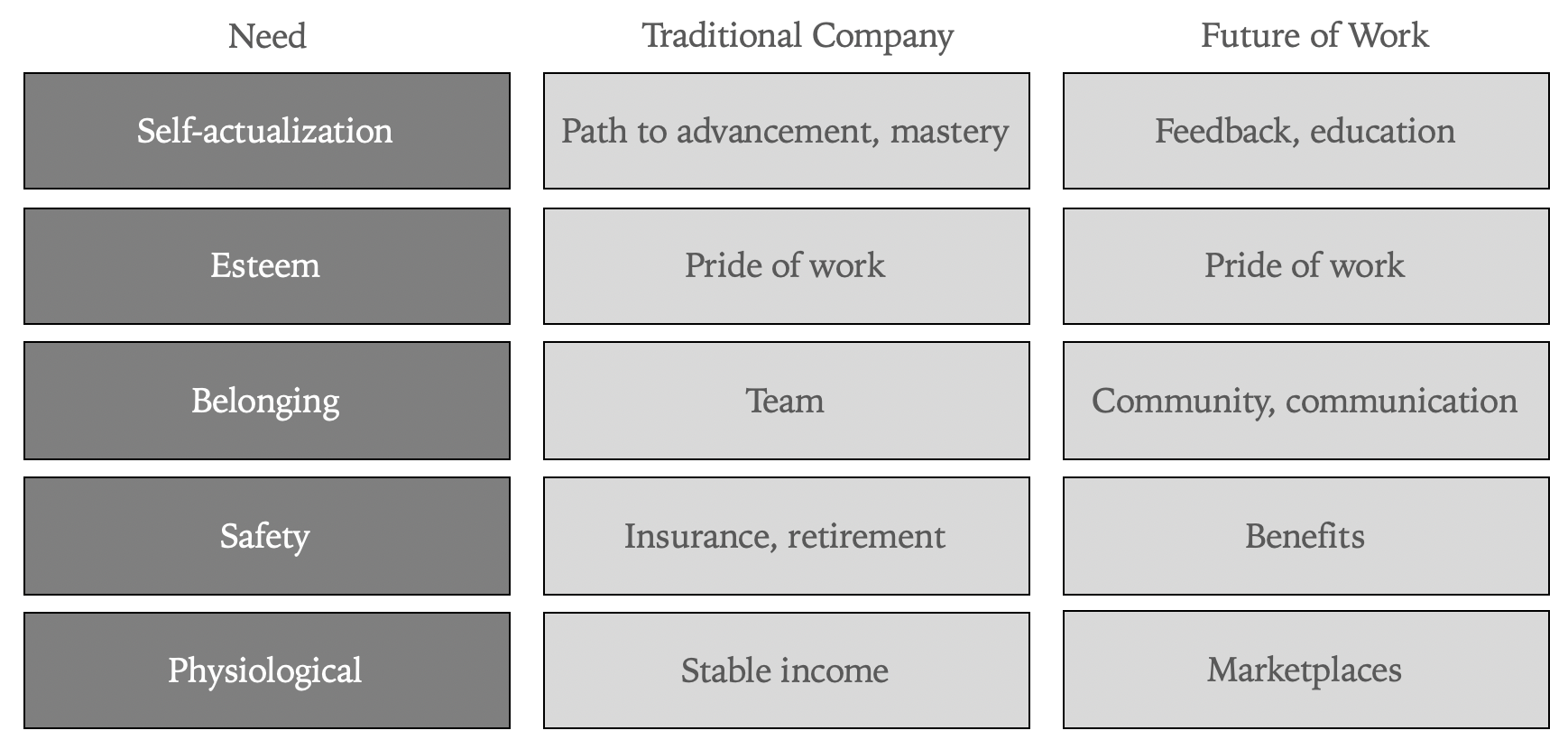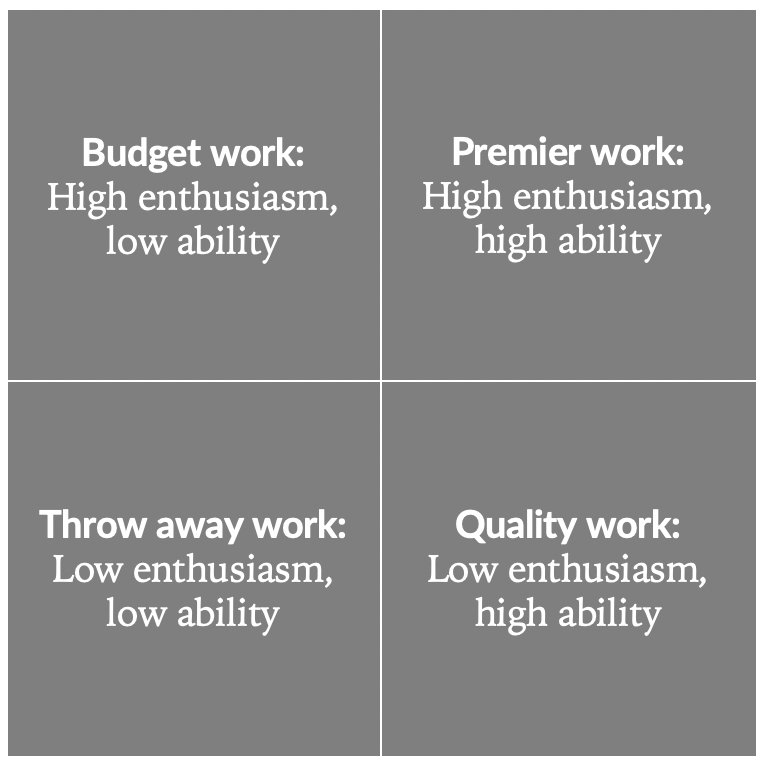Many great venture investment opportunities emerge from the deconstruction of some accepted norm or behavior. One of the most famous deconstructions was that of Craigslist where verticalized marketplaces like Airbnb, Let Go, Stubhub, Indeed, etc., emerged to do one of the many things Craigslist does but do it really well. This is the reason deconstruction works — specificity enhances the quality of the offering.
Another major deconstruction is beginning to happen: The deconstruction of the company. Not the legal parts of what makes up a corporation, but what a company provides to its employees. The deconstruction of the company will enable the future of work, which will be more freelance and more remote.
A traditional company addresses the common human needs from Maslow’s hierarchy. It provides income (physiological), benefits (safety), coworkers (belonging), culture (esteem), and advancement, mastery (self-actualization). As freelance work and distributed teams continue to rise, it creates a large opportunity for new businesses to address human needs by deconstructing the company.
How a Company Addressed Employee Needs

Physiological Needs
The reason most people work is to take care of physiological needs. Companies address the need by providing employees money for services. Future of work businesses that focus on the physiological needs of workers will largely be marketplaces that match buyers and sellers of labor. Upwork and Fivver are early examples of labor marketplaces, as are Uber and Lyft.
In the spirit of deconstruction, we expect to see marketplaces become more specific to better serve a subset of the freelance industry. There’s a market for many specialized marketplaces that build tools to address the unique needs for their target freelance market.
Graphite provides a marketplace for high-level business and finance talent. 99Designs is focused on freelance designers. Toptal only works with the best-of-the-best freelancers. We’ve also invested in two companies that provide specific marketplaces: Wethos and Invisible. Wethos enables thousands of expert marketing specialists to connect & form temporary micro-agencies, from wherever they are, while Invisible works with English-speaking, foreign talent to deliver a human-powered AI that can do almost anything. Each of those companies can offer their laborers unique work opportunities and their labor buyers unique services they can’t easily get anywhere else.
In Maslow’s hierarchy, each layer creates the foundation for the next. It may seem obvious, but the marketplace function in the future of work provides the ability for other companies, as well as the marketplaces themselves, to address the other needs. Without a robust marketplace that effectively and efficiently matches the right workers to the right jobs, the future of work will fail before it starts.
Safety Needs
Health insurance and retirement are the two most important safety needs that companies provide their employees. Freelancers and transient workers aren’t afforded the same benefits. The benefits gap is one of the biggest concerns for freelancers, which is why we invested in Catch. Catch is focused on creating a mobile safety net of insurance and retirement benefits for the next generation workforce.
Aside from the core needs in insurance and retirement, freelance workers see themselves as mini corporations. They’ll need products like reliable, mobile-first business banking, tax, accounting, and business insurance services. Large, incumbent providers of these services will certainly market to the evolving workforce (Bank of America, H&R Block, etc.), but again, specificity is superior. Companies that build these services with freelance workers specifically in mind, tailored to how those workers want to work, will be able to provide better experiences.
Belonging Needs
Locality by nature fosters community. Coworkers in the same office in the traditional company interact frequently and in person, which builds trust. They may also spend time together outside of work. Teambuilding is about belonging.
Creating belonging will be one of the biggest challenges in the future of work because of the lack of locality. Remote, full-time workers as part of distributed teams will suffer more from belonging needs than freelancers since freelancers intend to be more transient. It’s not that freelancers don’t care about belonging, it’s that they optimize freedom over safety.
Tools that enable communication and community are the best answer. Slack is a core tool for enabling the future of work because it lets a distributed workforce communicate conversationally in real-time. Slack is only likely to grow in importance through the deconstruction of the company. The same can be said for Zoom and other teleconferencing tools.
Future of work platforms should consider ways to effectively incorporate communication tools into their offerings. This doesn’t mean simple messaging that would be better served in existing channels like email, text, or Slack, but rather rich communication tools that are designed to maximize collaboration on the specific kind of work happening on the platform and the optimal workflow to produce it.
Many attempts have been made as creating company social networks with varying success. Facebook Work is the newest. We don’t think social networks for the sake of updates are likely to create the kind of community that a traditional company creates. Frequency of communication, richness of communication (video), building of good processes, and even good old company retreats will be the pillars of creating community in the future of work.
Esteem Needs
Where physiological needs are simply about making money to live, esteem needs are about being proud of what you do. Esteem comes down to what the work, and therefore the company the freelancer is working for, means to them.
A traditional company builds esteem via managers who listen to the employee’s feedback and ambitions and try to assign them to the best-suited work. Since freelancers don’t have the same organizational structure, they have to self-direct finding the most fulfilling work.
Whether in the context of the traditional company structure or in the future of work, the degree to which a worker addresses their physiological needs dictates how much the worker can optimize for esteem over the long run. A worker that’s desperate for a job to make ends meet has less ability to think about their esteem needs than a worker who may have some stable work or savings.
In the traditional company structure, stable wages can lock more desperate employees into unengaging work. Stable wages can even lock high earners into unfulfilling jobs to maintain a lavish lifestyle. Physiological needs get met even though the worker isn’t engaged. A Gallup survey from 2017 suggests that only about a third of workers are engaged by their work. This isn’t optimal for the employee or employer. The future of work will offer opportunities for employees to transition into certain roles when income is more necessary and into other roles when esteem is more desirable.
A key esteem feature for marketplaces will be efficient job matching that takes into account a worker’s ability to do a job and their predicted (or collected) excitement about the job. By factoring in these two components, marketplaces should give employers a tool that lets them tweak how much they’d pay to get a job done based on a worker’s estimated ability and estimated excitement. A company might want to offer someone more money if they have high ability to do a task well but low excitement or they might want to save money by finding someone with a high level of excitement but low skill level and hope enthusiasm wins out. The best fit will probably always be those who have high ability and high enthusiasm.
Esteem Work Matrix

Self-Actualization Needs
Self-actualization is about mastery and a path to advancing one’s career. A commitment to mastery is a dedication to doing a job well through constant improvement. Improvement happens through three mechanisms in either the company or future of work context: Feedback and implementation, education, and working with the right people.
At a traditional company provides feedback through employee review processes to help employees grow and advance. The freelance economy doesn’t have the same organized structure to collect feedback, nor does it have a managerial structure to help employees implement feedback. The solution may be a mix of data collection, AI-coaching, and human coaching.
Education is one area that may look the same across traditional companies and the future of work. Education is likely to be provided by schools, boot camps, specialty programs, certifications, etc. The core difference may be that traditional companies subsidize employee education in some way where freelance workers bear the costs themselves. In the latter case, education programs that offer alternative financing options like income-share agreements (ISAs) may be the most viable.
Working with the right people may seem to fit the belonging category, but the surrounding oneself with a mix of the right people — ones that are junior and growing, peers, and senior — is an important part of self-actualization. A traditional company may achieve this through mentor programs. In the future of work, mixing with the right people may happen through professional networks, both online and off.
Self-actualization needs will be served by both standalone companies and as components of great marketplace offerings. Things like coaching and education fit best as standalone offerings, while the more data- and community-focused pieces will be better addressed by marketplaces.
Let the Deconstruction Begin
The way the traditional company structure addresses employee needs is a valuable guide to what we must build for the freelance and remote workforce of the future. Even though the way these future workers think about work is different than a traditional company employee, human needs and desires don’t change. We all need to meet basic needs, feel safe, have a sense of belonging, and see a path to satisfaction and mastery. Let the deconstruction of the company begin or, perhaps, just continue.
Disclaimer: We actively write about the themes in which we invest or may invest: virtual reality, augmented reality, artificial intelligence, and robotics. From time to time, we may write about companies that are in our portfolio. As managers of the portfolio, we may earn carried interest, management fees or other compensation from such portfolio. Content on this site including opinions on specific themes in technology, market estimates, and estimates and commentary regarding publicly traded or private companies is not intended for use in making any investment decisions and provided solely for informational purposes. We hold no obligation to update any of our projections and the content on this site should not be relied upon. We express no warranties about any estimates or opinions we make.
